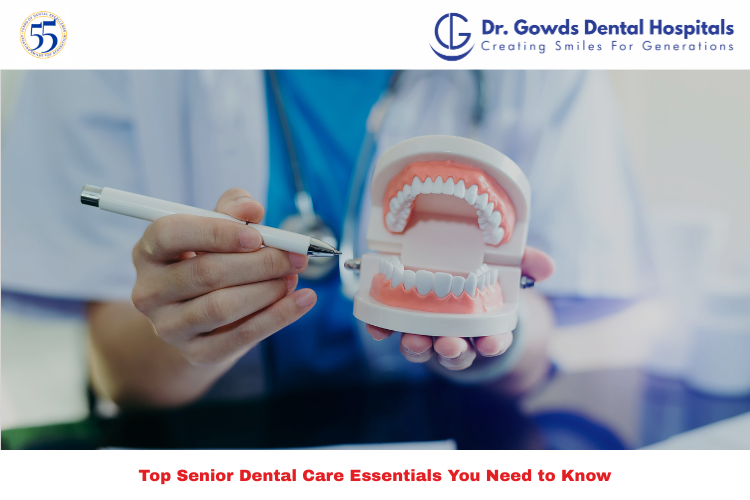Schedule Appointment



As the years go by, your health routines naturally shift—and your dental care should be no exception. Senior dental care is more than brushing and flossing; it’s about maintaining the freedom to eat well, speak clearly, and smile without hesitation.
Whether you’re adjusting to new health changes or simply want to preserve your natural teeth, this guide walks you through practical, real-world steps to protect your smile at every stage of life. From tackling common concerns like gum disease, dry mouth, or living with dentures, we’ve got your back.
Let’s be honest: aging gracefully takes effort—and your mouth is no exception. Years of wear, certain medications, and even chronic conditions like diabetes can quietly chip away at oral health. That’s why good senior dental care can make such a noticeable difference.
For many older adults, ignoring dental needs leads to more than just toothaches. It can result in infections, nutritional challenges, and even increase the risk of other health problems. Simple issues like dry mouth or early-stage gum disease may not seem like emergencies, but if left untreated, they can escalate.
Aging doesn’t guarantee dental problems, but certain conditions show up more often in later years. Knowing what to watch for is half the battle.
Think of gum disease as the silent thief of oral health. It sneaks up with barely any symptoms at first—maybe just some bleeding when you brush. But over time, it can loosen teeth, damage bone, and cause bad breath. Seniors are more vulnerable because of years of plaque buildup or inconsistent dental visits in the past.
Plenty of medications come with dry mouth as a side effect. And unfortunately, a dry mouth isn’t just uncomfortable—it creates the perfect environment for bacteria to thrive. Without enough saliva, it’s harder to fight off decay and maintain a healthy pH in the mouth.
Tooth loss isn’t inevitable, but it’s common among older adults. Many turn to dentures for function and appearance. While they can restore your smile, dentures require proper care—and when they don’t fit right, they can cause sore spots and even infections.
There’s no substitute for consistency. A strong daily routine forms the heart of any good senior dental care plan.
Here’s what that might look like:
Just five to ten minutes a day of focused oral hygiene can mean fewer dentist visits and a lot less discomfort over time.
Even if you haven’t had a cavity in years, don’t skip your dental visits. Senior dental care goes far beyond fillings. Regular checkups help catch small issues before they turn serious.
Your dentist can:
Even with full dentures, your dentist should be checking the tissues in your mouth and screening for signs of oral cancer.
If you rely on dentures, proper maintenance keeps them comfortable and long-lasting.
Some tips to follow:
And if your dentures ever feel uncomfortable or start to slip, don’t just live with it—schedule a visit. Adjustments are common and help you avoid soreness or worse.
Dealing with dry mouth can be frustrating, but there are ways to ease it.
Try the following:
Left unchecked, dry mouth contributes to more cavities, so don’t ignore it—it’s a key part of smart senior dental care.
Good oral health starts in the kitchen. The right foods help protect teeth and support your gums, especially as you age.
Focus on:
Also, if you wear dentures, remember to cut food into smaller bites and chew evenly to avoid discomfort.
You don’t need perfect teeth to have a healthy mouth—you just need a consistent plan. From managing dentures and avoiding gum disease, to getting ahead of dry mouth, a few small steps can go a long way.
With personalized, regular attention, senior dental care can keep your mouth feeling fresh and functional—and help you keep smiling through every season of life.
Visit us at–
Every 6 months is ideal. But if you’re managing conditions like gum disease or adjusting dentures, your dentist might want to see you more often.
Sometimes. Drinking water, using special mouth rinses, or chewing sugar-free gum can relieve dry mouth. But if it’s medication-related, speak with your doctor.
Dentures are common and affordable, but implants or bridges might be alternatives depending on your situation.
Brush, floss, and don’t miss cleanings. Gum disease develops slowly, so prevention is everything.
Get them checked. Dentures wear down or your mouth shape may change. A refitting can make a big difference.